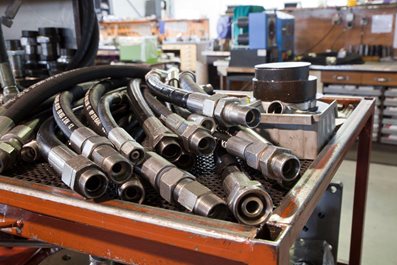Dos and Don’ts of Filtration and Conditioning of Hydraulic Systems
For hydraulic systems to function correctly, they need the right type of hydraulic fluid. The fluid is responsible for transmitting the power as well as lubricating the system components.
The fluid on its own will not keep the hydraulic system humming along. How the fluid is filtered and the condition of the fluid also play important roles in keeping hydraulic systems working correctly.
Do change your filters often.
.jpg?width=399&height=266)
It is important to make sure your filters never become so full of contaminant that they block. Blocked filters place back pressure on the system and go into bypass mode allowing contaminant to infect the whole hydraulic system.
Do use high-quality filters.
High-quality filters are more efficient at removing particles and contaminants from the hydraulic fluid. You should also consider using larger filters when the system can accommodate them, especially in dirty operating environments. Larger filters have a larger capacity, so they need to be changed less often than smaller ones.
Do install new filters whenever you change the fluid.
While you may need to change your filters in between fluid changes, you should always install new filters when the fluid is changed. This way, not only is the fluid new but also the filters.
Do check fluid levels and condition daily.
Get into the habit of verifying the fluid level and condition of the fluid. If the fluid is low, this could indicate there is a leak. When fluid levels are low it can cause the system to operate at higher temperatures and decrease the useful lifespan of pumps, motors, and related components. Leaks also increase the risk of fluid contamination as air, water, dirt, and debris can be sucked into the system.
Furthermore, you should get into the habit of inspecting the condition of the fluid. You want to check the fluid for small metal flakes or other contaminants. If you notice any, this could indicate a problem with pumps, motors, or other moving parts.
Do change the fluid regularly.
You should change the hydraulic fluid at the right intervals. Most people keep track of the number of operating hours the system is in use to determine when to change the fluid. When the system is used less frequently, then fluid changes should occur at the manufacturer-recommended intervals. Regular hydraulic fluid changes ensures proper fluid condition.
Don’t operate the system without fluid.
This should be a given, but some people don’t take the time to check the fluid levels and are surprised when the system overheats and fails because there was no fluid in the reservoir. When systems are operated without fluid, parts can seize and lead to costly repairs.
Don’t operate the system with fluid leaks.

Fluid leaks are not good and can cause operational issues, as well as introduce contaminants into the system. You want to fix leaks as soon as possible.
Don’t skip preventative maintenance.
Take the time to complete system checks before operating the system, as well as perform regular preventative maintenance. Doing these things can help find problems before they cause serious operational issues.
Don’t just pour new fluid into the fluid reservoir.
New fluid is never 100 percent clean. When adding fluid to the system, use a filling filter to filter out any contaminants. In addition, anytime you need to add more fluid, use a clean filling filter.
Don’t operate the system on constant filter bypass.
Some hydraulic systems have a setting where you can bypass filters. When you operate the system in bypass mode, the fluid is not being filtered. As a result, the risks of fluid contamination increase.
Contact Us About Hydraulic Systems
By using these dos and don’ts, you are sure to keep your hydraulic systems working correctly. For all your hydraulic pumps, hydraulic motors, and related hydraulic parts and components, please contact White House Products, Ltd. at +44 (0) 1475 742500 today!
Back to blog posts